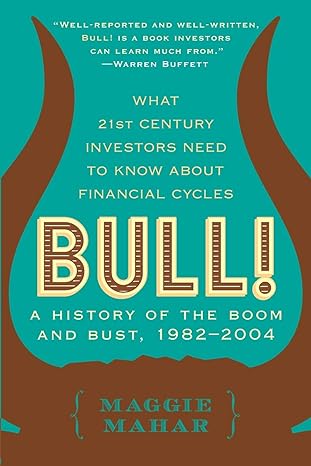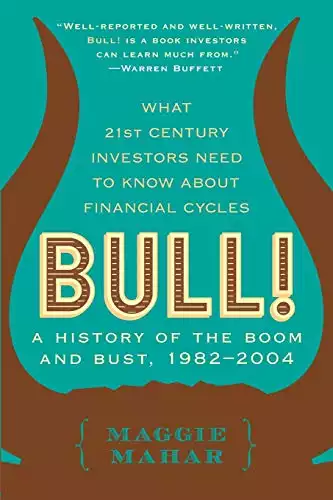Overview : Bull
- Book Title: Bull: A History of the Boom and Bust, 1982-2004
- Author: Maggie Mahar
- Publication Date: February 2003
- price: $14.19
- Pages: 528
Overview of the Book
Maggie Mahar is a seasoned journalist and author with expertise in economics, healthcare, and financial markets. She has written extensively for leading publications, offering deep insights into complex economic trends.
"Bull" by Maggie Mahar:
The book "Bull!" explores the rise and fall of the great bull market of 1982-1999, blending historical analysis with compelling narratives to explain the market's boom and subsequent bust.
Introduction
In the ever-evolving world of finance and investing, understanding historical market trends is crucial for making informed decisions. Maggie Mahar's "Bull: A History of the Boom and Bust, 1982-2004" offers a captivating journey through one of the most tumultuous periods in American financial history. This comprehensive review will explore the book's key themes, writing style, and relevance to modern investors.
Book Summary
Mahar, a seasoned financial journalist, meticulously chronicles the extraordinary bull market that dominated the U.S. economy for over two decades. The book begins in the early 1980s, a time of high inflation and unemployment, and traces the market's evolution through the dot-com bubble's burst in the early 2000s.
Key quote: "The bull market of 1982-1999 was, quite simply, the greatest boom in financial assets that the world has ever seen."
The Anatomy of a Bull Market
Mahar expertly dissects the factors that fueled the unprecedented market growth, including:
- Reagan-era deregulation policies
- Declining interest rates
- Technological advancements
- Alan Greenspan's influential tenure as Federal Reserve Chairman
The Psychology of Investing
One of the book's strengths lies in its exploration of investor psychology. Mahar delves into the collective mindset that drove speculative fervor, often at the expense of traditional investment wisdom. This analysis provides valuable insights for modern investors navigating today's market conditions.
The Inevitable Bust
As the narrative progresses, Mahar skillfully documents the unraveling of the bull market, with a particular focus on the dot-com bubble. Her analysis of the warning signs and subsequent market collapse serves as a cautionary tale for contemporary investors.
Analysis of Themes
"Bull" explores several themes relevant to personal finance and investing:
- The cyclical nature of markets
- The impact of government policies on economic trends
- The role of technology in shaping market dynamics
- The importance of understanding market fundamentals
These themes resonate strongly with current market trends, including the rise of cryptocurrencies and the ongoing debate about market regulation.
Writing Style
Mahar's writing is both engaging and informative. She strikes a balance between detailed financial analysis and compelling storytelling, making complex economic concepts accessible to a broad audience. However, some readers may find the abundance of financial jargon challenging.
Strengths and Weaknesses
Strengths:
- Comprehensive historical analysis
- Insightful exploration of investor psychology
- Clear connection between past events and present market conditions
Weaknesses:
- Limited global perspective
- Dense financial terminology may be difficult for some readers
Comparison to Other Works
"Bull" stands out among financial history books for its in-depth focus on a specific period. While works like Burton Malkiel's "A Random Walk Down Wall Street" offer broader investment advice, Mahar's book provides a laser-focused examination of a transformative era in American finance.
Compared to "The Big Short" by Michael Lewis, which concentrates on the 2008 financial crisis, "Bull" offers a longer historical perspective, making it valuable for understanding long-term market cycles.
Relevance to Modern Investing
Despite focusing on events from decades past, "Bull" remains highly relevant to today's investors. The lessons drawn from the boom and bust cycle of 1982-2004 can be applied to current market phenomena, such as:
- The rapid growth and volatility of cryptocurrency markets
- The impact of low interest rates on investment strategies
- The role of technology companies in driving market trends
Mahar's insights into market psychology and the dangers of speculative bubbles are particularly pertinent in today's fast-paced financial landscape.
Highlights from Bull by Maggie Mahar
- Stock market boom: Explores the 1990s bull market and its driving forces.
- Investor psychology: Analyzes the behaviors and attitudes of investors during market upswings.
- Wall Street culture: Critiques the practices of brokers, analysts, and financial institutions.
- Speculation vs. value investing: Highlights the dangers of speculative investing over sound fundamentals.
- Market manipulation: Discusses how market players can influence stock prices for profit.
- Inequality in finance: Examines the widening wealth gap during market growth.
Conclusion
"Bull: A History of the Boom and Bust, 1982-2004" is an essential read for anyone seeking to understand the complex interplay of economics, politics, and psychology that shapes financial markets. Maggie Mahar's thorough research and engaging narrative style make this book both informative and enjoyable.
While the book focuses on a specific historical period, its lessons are timeless. Investors, both novice and experienced, will find valuable insights to apply to their personal finance strategies and market analysis.
If you're looking to deepen your understanding of market cycles and improve your investment decisions, "Bull" is a must-read. It serves as both a fascinating historical account and a guide for navigating the ever-changing world of finance.





